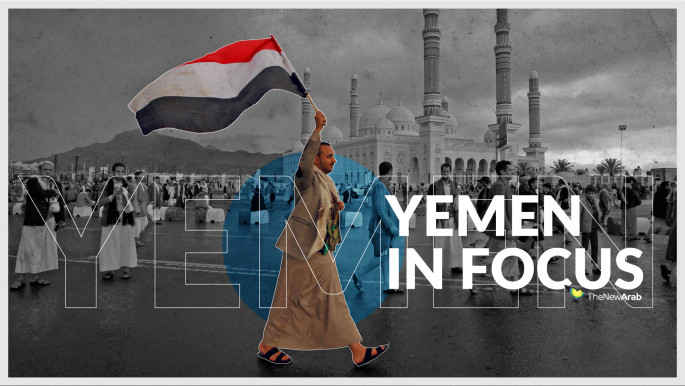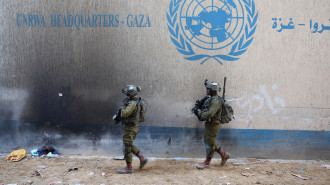Yemen in Focus: Saudi-coalition recruits child soldiers for border protection
According to an Al Jazeera exclusive, the coalition, which fights alongside, and for government forces, takes on children from among poor families in Taiz and government-held areas in the south before sending them over the Saudi border where they are made to defend the kingdom from frequent Houthi attacks.
Recruiters and people traffickers often promise the teenagers, sometimes as young as 14, work in kitchens with lucrative salaries, but the children end up at training camps and later engage in battles with rebels.
They are then passed along a trafficking route across the war-torn country to the Saudi border, where they are given ID cards and spirited across the border to training camps in the kingdom. Others remain in Yemen where they train and fight alongside government forces battling the rebels on home ground.
But the use of child soldiers in the devastating war is neither new nor shocking. The truth is all factions involved in the Yemen conflict have exploited the economic hardships of families to aid in their recruitment of soldiers.
According to a source within the force, the pro-government coalition forces offer around 60,000 Yemeni Rial – that's anything between £80-£180 depending on the local currency exchange – to children who join their ranks, and considering the situation for most families at the moment, that is a large carrot on a stick.
 |
Recruiters and people traffickers often promise the teenagers, sometimes as young as 14, work in kitchens with lucrative salaries, but the children end up at training camps and later engage in battles with rebels |  |
Houthi attacks
Meanwhile in the opposing camp, Houthi rebels managed to drive two drones straight into the heart of a major airbase in the southwest of the Saudi kingdom before the devices were intercepted by Saudi air defence this week.
Coalition spokesman Colonel Turki al-Maliki confirmed the drones targeted Khamis Mushait, home to a vital Saudi airbase, and wounded five civilians on the ground.
Houthi cross-border missile attacks have become a frequent annoyance in recent years, some of which have come dangerously close even for the coalition's liking. In 2018, the rebels claimed attacks on airports in Abu Dhabi and Dubai, the two main cities of the United Arab Emirates, the kingdom's principal coalition ally.
While Saudi Arabia has said the missiles were all intercepted by air its defences, it has confirmed one civilian was killed by shrapnel. Meanwhile, tourist hub UAE has denied coming under missile attack.
US attacks
In other drone strike news, the United States carried out six airstrikes against alleged al-Qaeda militant in al-Bayda governate, the first such US military move in the war-torn country in more than three months.
 |
Drone attacks against AQAP intensified after US President Donald Trump took office in January 2017 and hundreds of civilians have been killed |  |
"In coordination with the government of Yemen, US forces continue to support ongoing counterterrorism operations against AQAP and ISIS-Y to disrupt and destroy militants' attack-plotting efforts, networks, and freedom of manoeuvre within the region," Lt. Col. Earl Brown, a spokesman for US Central Command, said in a statement.
Authorities have not released information on the casualties from the raids but an attack in January confirmed the killing of al-Qaeda commander Jamal al-Badawi, one of the masterminds behind the USS Cole bombing in 2000.
The US military's activity in Yemen far exceeds that of the Saudi-led coalition which only began its bombing campaign in March 2015.
Since 2009, the US has been known as the only force to operate armed drones over Yemen, where it (usually) targets members of the Yemen-based al-Qaeda in the Arabian Peninsula (AQAP), which it considers to be the radical group's most dangerous branch.
Drone attacks against AQAP intensified after US President Donald Trump took office in January 2017 and hundreds of civilians have been killed in what has become to be known as repeated collateral damage incidents.
So, while the world's gaze focuses on the Saudi-led coalition and its Houthi arch ally, it is worth keeping an eye AQAP which has since flourished in the chaos of the impoverished country's civil war.
Sana Uqba is a journalist at The New Arab.
Follow her on Twitter: @Sanasiino
Yemen In Focus is a new, regular feature from The New Arab. Read previous articles here:
 |
|

![Palestinians mourned the victims of an Israeli strike on Deir al-Balah [Getty]](/sites/default/files/styles/image_684x385/public/2024-11/GettyImages-2182362043.jpg?h=199d8c1f&itok=xSHZFbmc)


![The law could be enforced against teachers without prior notice [Getty]](/sites/default/files/styles/image_684x385/public/2178740715.jpeg?h=a5f2f23a&itok=hnqrCS4x)
 Follow the Middle East's top stories in English at The New Arab on Google News
Follow the Middle East's top stories in English at The New Arab on Google News


